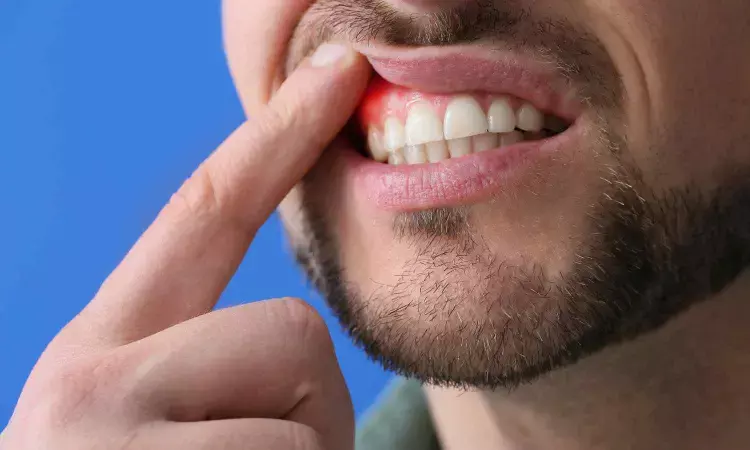- Home
- Medical news & Guidelines
- Anesthesiology
- Cardiology and CTVS
- Critical Care
- Dentistry
- Dermatology
- Diabetes and Endocrinology
- ENT
- Gastroenterology
- Medicine
- Nephrology
- Neurology
- Obstretics-Gynaecology
- Oncology
- Ophthalmology
- Orthopaedics
- Pediatrics-Neonatology
- Psychiatry
- Pulmonology
- Radiology
- Surgery
- Urology
- Laboratory Medicine
- Diet
- Nursing
- Paramedical
- Physiotherapy
- Health news
- Fact Check
- Bone Health Fact Check
- Brain Health Fact Check
- Cancer Related Fact Check
- Child Care Fact Check
- Dental and oral health fact check
- Diabetes and metabolic health fact check
- Diet and Nutrition Fact Check
- Eye and ENT Care Fact Check
- Fitness fact check
- Gut health fact check
- Heart health fact check
- Kidney health fact check
- Medical education fact check
- Men's health fact check
- Respiratory fact check
- Skin and hair care fact check
- Vaccine and Immunization fact check
- Women's health fact check
- AYUSH
- State News
- Andaman and Nicobar Islands
- Andhra Pradesh
- Arunachal Pradesh
- Assam
- Bihar
- Chandigarh
- Chattisgarh
- Dadra and Nagar Haveli
- Daman and Diu
- Delhi
- Goa
- Gujarat
- Haryana
- Himachal Pradesh
- Jammu & Kashmir
- Jharkhand
- Karnataka
- Kerala
- Ladakh
- Lakshadweep
- Madhya Pradesh
- Maharashtra
- Manipur
- Meghalaya
- Mizoram
- Nagaland
- Odisha
- Puducherry
- Punjab
- Rajasthan
- Sikkim
- Tamil Nadu
- Telangana
- Tripura
- Uttar Pradesh
- Uttrakhand
- West Bengal
- Medical Education
- Industry
Poor Periodontal Health May Increase Risk of Cognitive Decline, finds study

Researchers have discovered in a new study that bad oral health during the periodontal stage can raise the possibility of cognitive decline, although no direct correlation with dementia was established. The study was published in the Journal of Clinical Periodontology by Sam A. and fellow researchers. The findings present strong evidence that some dimensions of poor periodontal health bleeding gums, large periodontal pockets, and moderate-to-severe periodontitis might be cognitive decline precursors. The results indicate that periodontal disease management and dental care during routine check-ups can have a protective role in maintaining cognitive function with advancing age.
The study comprised both cross-sectional and longitudinal analysis with data from two large health surveys. There were 4,046 participants in the cross-sectional component and 2,769 participants in the longitudinal follow-up. Furthermore, 4,073 persons were assessed for incident dementia from 2000 to 2015. Clinically and radiographically, periodontal health was determined with special attention to periodontal pocket depth (PPD), bleeding on probing (BOP), and tooth loss (edentulism). Periodontitis was defined as moderate or severe according to these clinical indicators. Cognitive abilities were assessed at baseline and follow-up with standard tests, and diagnoses of dementia were obtained from health registers.
Statistical models were analyzed with logistic regression and Cox proportional hazards, controlling for potential confounders and reverse causality.
Key Findings
Cross-sectional associations showed a number of significant correlations between poor periodontal markers and lower cognitive performance:
Lower general cognition was associated with moderate periodontitis (OR = 1.19; 95% CI: 1.02–1.40).
Moderate periodontitis was associated with verbal fluency (OR = 1.16; 1.00–1.35) and immediate recall (OR = 1.22; 1.04–1.42).
PPD was associated with decreased overall cognition (OR = 1.22; 1.04–1.43) and verbal fluency (OR = 1.18; 1.02–1.38).
Bleeding on probing (BOP) was linked to decreased verbal fluency (OR = 1.26; 1.07–1.48) and immediate recall (OR = 1.22; 1.02–1.45).
Longitudinally, the same associations were observed between declining periodontal status and cognitive decline:
Moderate periodontitis had a risk for decline in immediate recall (OR = 1.29; 1.04–1.60).
Severe periodontitis was linked to the decline of verbal fluency (OR = 1.46; 1.01–2.11).
PPD was related to the decline of immediate recall (OR = 1.23; 1.00–1.53).
BOP was once more related to the deterioration of verbal fluency (OR = 1.31; 1.05–1.63).
Edentulism (toothlessness) had high associations with several cognitive domains, ranging from 1.71 to 1.88 odds ratio.
The study authors conclude that periodontal ill health, particularly moderate to severe periodontitis, bleeding on probing, and tooth loss could increase the risk for cognitive decline. More studies are needed to elucidate the biological mechanisms of such associations and to investigate if periodontal health improvement can aid in reducing cognitive decline in older adults.
Reference:
Asher S, Suominen AL, Stephen R, Ngandu T, Koskinen S, Solomon A. Clinical and Radiological Markers of Periodontal Status and Risk of Cognitive Decline and Incident Dementia. J Clin Periodontol. 2025 May 15. doi: 10.1111/jcpe.14173.
Dr Riya Dave has completed dentistry from Gujarat University in 2022. She is a dentist and accomplished medical and scientific writer known for her commitment to bridging the gap between clinical expertise and accessible healthcare information. She has been actively involved in writing blogs related to health and wellness.
Dr Kamal Kant Kohli-MBBS, DTCD- a chest specialist with more than 30 years of practice and a flair for writing clinical articles, Dr Kamal Kant Kohli joined Medical Dialogues as a Chief Editor of Medical News. Besides writing articles, as an editor, he proofreads and verifies all the medical content published on Medical Dialogues including those coming from journals, studies,medical conferences,guidelines etc. Email: drkohli@medicaldialogues.in. Contact no. 011-43720751


